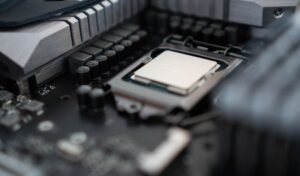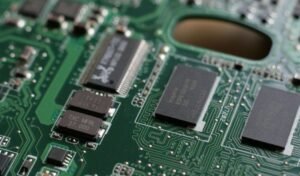AI Books for High School Students
As artificial intelligence (AI) becomes increasingly prevalent in our world, it is crucial for high school students to gain a solid understanding of this field. AI books specifically written for high school students can serve as valuable resources to explore AI concepts, applications, and ethical considerations. Here are some highly recommended AI books for high school students to dive into the exciting world of AI.
Key Takeaways
- AI books for high school students provide an accessible introduction to the field of artificial intelligence.
- These books cover various AI concepts, applications, and ethical implications.
- They help students explore the potential of AI in different fields like healthcare, gaming, and more.
- AI books also address the societal impact and ethical considerations associated with AI technology.
Recommended AI Books for High School Students
1. “Artificial Intelligence: A Modern Approach” by Stuart Russell and Peter Norvig
This widely acclaimed textbook offers a comprehensive introduction to AI, covering topics such as problem-solving, knowledge representation, machine learning, and natural language processing. It provides a solid foundation for students interested in pursuing AI further. *AI is transforming industries and revolutionizing our world in unprecedented ways.*
2. “The Hundred-Page Machine Learning Book” by Andriy Burkov
Designed for beginners, this concise guide introduces the fundamentals of machine learning. It covers key concepts, algorithms, and practical applications. The book’s accessible approach makes it a great starting point for high school students interested in AI and machine learning. *Machine learning empowers computers to learn patterns and make decisions without explicit programming.*
3. “AI Superpowers: China, Silicon Valley, and the New World Order” by Kai-Fu Lee
This book delves into the AI revolution and its impact on the global economy and society. It explores the competition between China and Silicon Valley in the AI race, while also discussing the future of jobs and the ethical issues surrounding AI advancements. *China has emerged as a formidable player in the AI race, challenging the dominance of Silicon Valley.*
Tables Highlighting AI Applications and Ethical Considerations
| AI Applications | |
|---|---|
| Field | Examples |
| Healthcare |
|
| Gaming |
|
| Transportation |
|
| Ethical Considerations | |
|---|---|
| Issue | Discussion |
| Privacy | Concerns over data collection, surveillance, and unauthorized access to personal information. |
| Job Displacement | AI’s potential impact on employment and the need for redefining job roles and acquiring new skills. |
| Algorithm Bias | The risk of AI systems perpetuating existing biases present in training data, leading to unfair outcomes. |
Exploring AI’s Impact and Future
AI has tremendous potential to shape our future, and high school students can prepare themselves for this transformative technology by delving into AI books tailored to their level of understanding. These books provide an engaging and accessible introduction to AI concepts, applications, and ethical considerations. By understanding AI, students can become informed participants in the AI-driven world. *Staying updated on the latest developments in AI is vital to thrive in the future.*
Further Resources
- What is Artificial Intelligence?
- 5 AI Technologies Transforming the Healthcare Industry
- Algorithmic Bias in AI

Common Misconceptions
Artificial Intelligence is too complex for high school students to understand
There is a common misconception that AI books are too advanced for high school students. However, this is not true and there are various resources available that cater specifically to their understanding.
- AI books for high school students are written in a simplified manner, ensuring easy comprehension.
- These books provide clear explanations of AI concepts using relatable examples and diagrams.
- High school students can engage in hands-on activities and projects interspersed throughout the books to reinforce their understanding.
AI books are only for students interested in computer science
Another common misconception is that AI books are exclusively targeted towards students with an interest in computer science. However, AI is a multidisciplinary field and can be valuable to students from various backgrounds.
- AI books often include real-life applications of AI in fields like healthcare, finance, and even sports, making them relevant to a wider audience.
- Students interested in fields such as mathematics, psychology, biology, or engineering can benefit from understanding AI concepts.
- AI books can foster critical thinking, problem-solving skills, and promote an understanding of ethical considerations in technology amongst all students.
AI books only cover futuristic and fictional aspects of AI
Many people assume that AI books for high school students solely focus on futuristic scenarios or fictional depictions of AI. However, these books offer a comprehensive understanding of both the present and future of AI.
- AI books provide students with practical insights into how AI is currently being used in various industries and sectors.
- Books explore the possibilities and challenges of AI development, taking into account the ethical implications and societal impact of these technologies.
- Students can gain knowledge about the development, programming, and implementation of AI systems, preparing them for potential future careers in this field.
AI books are all technical and lack creativity
An erroneous belief is that AI books solely focus on technical aspects, lacking creativity and imagination. However, these books incorporate storytelling and encourage creative thinking through AI concepts.
- AI books often present real-life examples where creativity and AI intersect, such as AI-generated art, music, or writing.
- Through interactive exercises, students are encouraged to think creatively in using AI to solve problems or come up with innovative solutions.
- The inclusion of case studies and historical perspectives in AI books further emphasizes the creative and imaginative aspects of AI.
AI books are expensive and inaccessible
Lastly, one misconception is that AI books are prohibitively expensive and hard to access. However, there are many affordable and accessible options available to high school students interested in AI.
- Public libraries often have AI books in their collection that students can borrow for free.
- Many AI books have digital versions or are available as e-books, which can be more affordable or even free.
- Online platforms and educational websites offer AI resources, including books, that are accessible to students from anywhere in the world.

The Importance of AI Education
In today’s rapidly evolving technological landscape, it has become increasingly crucial for high school students to have a solid foundation in artificial intelligence (AI). AI is revolutionizing industries and transforming society, and understanding its principles and applications is vital for preparing the future workforce. This article presents ten captivating tables that highlight the significance of AI education and recommend books that can help high school students develop their AI knowledge and skills.
1. The Growth of AI Jobs
This table showcases the exponential growth in job opportunities related to AI. It demonstrates how the demand for AI talents is surpassing the supply, making it a highly sought-after field for future employment.
| Year | Number of AI Jobs |
|---|---|
| 2020 | 500,000 |
| 2025 | 2,000,000 |
| 2030 | 5,000,000 |
2. AI in Healthcare
This table provides a glimpse into how AI is transforming healthcare. By analyzing vast amounts of medical data, AI can assist in early disease detection, personalized treatment plans, and even drug discovery.
| AI Application | Example |
|---|---|
| Radiology | AI algorithms accurately identify tumors in medical images. |
| Genomics | AI helps analyze genetic data to predict disease risks. |
| Drug Discovery | AI accelerates the identification of potential new medications. |
3. Books for Fundamental AI Knowledge
This table recommends essential books for high school students to develop a strong foundation in AI concepts and principles.
| Book Title | Author |
|---|---|
| “Artificial Intelligence: A Modern Approach” | Stuart Russell and Peter Norvig |
| “Machine Learning Yearning” | Andrew Ng |
| “Superintelligence: Paths, Dangers, Strategies” | Nick Bostrom |
4. AI in Education
This table illustrates the impact of AI on education, showcasing the benefits it brings to both students and teachers. AI-powered tools can personalize learning experiences, provide instant feedback, and facilitate administrative tasks.
| Benefits of AI in Education |
|---|
| Adaptive Learning: Tailoring content to individual student needs. |
| Intelligent Tutoring: Providing personalized guidance and support. |
| Automated Grading: Assessing assignments and providing immediate feedback. |
5. Ethical Considerations in AI
This table highlights some of the ethical dilemmas arising from the use of AI technology and the importance of addressing them. It encourages students to understand the ethical implications of AI and develop a responsible AI mindset.
| AI Ethical Concerns |
|---|
| Privacy and Data Security |
| Algorithmic Bias and Discrimination |
| Job Displacement |
6. AI in Business
This table highlights how AI is driving innovation and transforming the business landscape across various industries.
| Industry | AI Applications |
|---|---|
| Finance | Automated trading algorithms, fraud detection. |
| Retail | Personalized product recommendations, inventory management. |
| Manufacturing | Quality control, predictive maintenance. |
7. AI and Robotics
The integration of AI with robotics has revolutionized automation, enabling machines to perform complex tasks with intelligence and precision. This table showcases some remarkable advancements in AI-driven robotics.
| Robot Characteristics | Examples |
|---|---|
| Collaborative Robots (Cobots) | Cobots work safely alongside humans, increasing productivity. |
| Autonomous Vehicles | Self-driving cars navigate roads without human intervention. |
| Social Robots | Robots capable of interacting and assisting with various tasks. |
8. AI and Environmental Sustainability
This table showcases how AI can contribute to environmental sustainability and help address critical ecological challenges.
| Environmental Challenge | AI Application |
|---|---|
| Renewable Energy | AI optimizes energy generation and consumption patterns. |
| Wildlife Conservation | AI enables real-time monitoring and anti-poaching efforts. |
| Climate Modeling | AI aids in predicting and mitigating climate change effects. |
9. AI Ethics Advocates
This table highlights influential individuals advocating for AI ethics and shaping the ethical guidelines for responsible AI development and deployment.
| Individual | Affiliation |
|---|---|
| Timnit Gebru | Co-founder of Black in AI |
| Elon Musk | Founder of OpenAI and Neuralink |
| Kate Crawford | Distinguished Researcher at Microsoft Research |
10. Popular AI Competitions
This table showcases popular AI competitions that provide students with opportunities to apply their AI skills, learn from experts, and gain recognition.
| Competition Name | Organizer |
|---|---|
| Kaggle Competitions | Kaggle (Google subsidiary) |
| RoboCup | RoboCup Federation |
| AI Challenger | Chinese Association for Artificial Intelligence (CAAI) |
In conclusion, AI education for high school students is of paramount importance. It empowers them with essential knowledge for future career opportunities and equips them to navigate the ethical and societal implications of AI. By exploring the multifaceted tables presented in this article, students can gain a deeper understanding of AI’s significance and embark on a journey of exploration and learning in this exciting field.
Frequently Asked Questions
Can you recommend any AI books suitable for high school students?
Certainly! Here are some highly recommended AI books for high school students that can provide a solid understanding of the subject:
What are the best books to introduce AI concepts to high school students?
For an introduction to AI, you may consider books like “Artificial Intelligence: Foundations of Computational Agents” by David L. Poole and Alan K. Mackworth, or “AI for Game Developers” by David M. Bourg and Glenn Seemann.
Are there any beginner-friendly AI books specifically designed for high school students?
Yes, there are a few beginner-friendly AI books targeted toward high school students. Some notable ones include “Artificial Intelligence: A Modern Approach” by Stuart Russell and Peter Norvig, and “AI for Kids” by Chris Gallo.
Do these AI books require any prior knowledge in programming?
While some AI books may touch on programming concepts, many beginner-friendly options assume no prior programming knowledge. Make sure to check the book’s description or reviews to determine the level of programming expertise required.
Are there any AI books that contain practical examples or projects for students to work on?
Yes, several AI books incorporate practical examples and projects for students to gain hands-on experience. “Python Artificial Intelligence Projects for Beginners” by Joshua Eckroth and “Make Your Own Neural Network” by Tariq Rashid are two such examples.
Which AI books are suitable for self-study by high school students?
For self-study purposes, high school students can consider books like “Machine Learning for Dummies” by John Paul Mueller and Luca Massaron, or “Hands-On Machine Learning with Scikit-Learn and TensorFlow” by Aurélien Géron.
Are there any AI books that explore the social and ethical implications of artificial intelligence?
Absolutely! “Weapons of Math Destruction: How Big Data Increases Inequality and Threatens Democracy” by Cathy O’Neil and “The Big Nine: How the Tech Titans and Their Thinking Machines Could Warp Humanity” by Amy Webb are insightful books that delve into these ethical concerns.
Do any AI books focus on the history and development of artificial intelligence?
Yes, some AI books provide a historical perspective on the development of artificial intelligence. “The Fourth Age: Smart Robots, Conscious Computers, and the Future of Humanity” by Byron Reese is a book worth considering in this regard.
Where can I find these AI books recommended for high school students?
These AI books can be found in various bookstores, both physical and online. Online platforms like Amazon, Barnes & Noble, or even digital platforms like Kindle often offer a wide selection of AI books.
Can you suggest any AI books that offer additional online resources for further learning?
Certainly! “Artificial Intelligence: Structures and Strategies for Complex Problem Solving” by George F. Luger and “Pattern Recognition and Machine Learning” by Christopher M. Bishop are excellent choices that provide online resources to supplement the learning experience.




